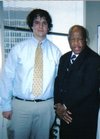Christianity and the Social Crisis in the 21st Century

Christianty and the Social Crisis in the 21st Century: The Classic That Woke Up The Church
In the wake of the success of God's Politics, comes an anniversary edition of Walter Rauschenbusch's Christianity and the Social Crisis, a book which outsold every other religious volume for three years and which has become a classic and mainstay for any Christian seriously interested in social justice.
PBS has named Rauschenbusch one of the most influential American religious leaders in the last 100 years, and Christianity Today named this book one of the top books of the century that have shaped contemporary religious thought. So it seems fitting on the 100th anniversary of the publication of Christianity and the Social Crisis that Rauschenbush's great–grandson should bring this classic back into print, adding a response to each chapter by a well–known contemporary author such as Jim Wallis, Tony Camplo, Cornel West, Richard Rorty, Stanley Hauerwas, and others.
Between 1886 and 1897, he was pastor of the Second German Baptist Church in the "Hell's Kitchen" area of New York City, an area of extreme poverty. As he witnessed massive economic insecurity, he began to believe that Christianity must address the physical as well as the spiritual needs of humankind. Rauschenbusch saw it as his duty as a minister and student of Christ to act with love by trying to improve social conditions.
This, in fact, inspired leaders such as Reinhold and Richard Niebuhr, Rev. Martin Luther King, Jr., Mahatma Ghandi and Bishop Desmond Tutu. "Christianity is in its nature revolutionary" Rauschenbusch wrote, and the significance of his work is that it spoke of society's responsibility to the poor and downtrodden.
In the present atmosphere of heightened debate and even antagonism between political and religious viewpoints Christianity and the Social Crisis will again be a book that will provoke intense responses by people on every side. As the disparity between the rich and the poor in America continues to widen in the 21st century, the book's explication of the radical social message of Jesus is as applicable today as it was 100 years ago.
Paul Rauschenbush was kind enough to send BDW Sr. a copy of this great book. I stole the book from BDW Sr. and plan to publish a review here and elsewhere in the next month or so.
Check it out at Amazon.
Labels: Walter Rauschenbusch


2 Comments:
Wow! The original book title was, of course, simply Christianity and the Social Crisis. I argued in the '90s that the text was still hauntingly current. I'll have to get a copy of the new version.
I met Paul Rauschenbusch several years back when I was visiting Riverside Church for a conference. Paul was a member there while a seminary student at Union Theological Seminary (rather than his great grandfather's stomping grounds of Colgate-Rochester). Great guy.
10:42 AM
Fantastic - can't wait to read the book and to read your review.
3:27 PM
Post a Comment
<< Home